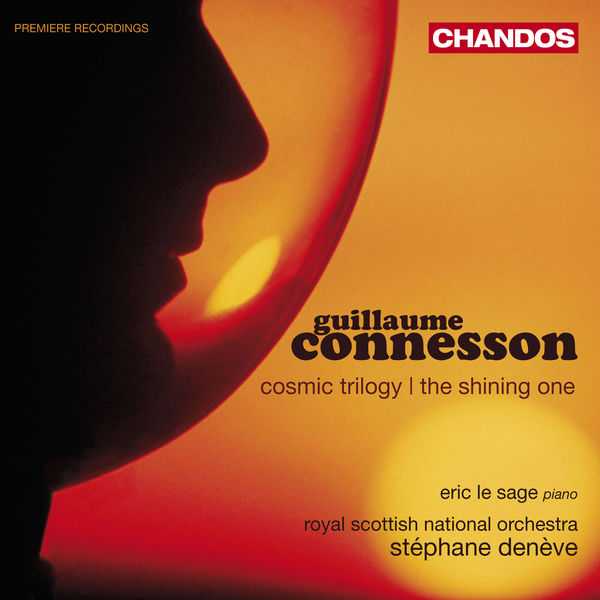

Composer: Guillaume Connesson
Performer: Eric Le Sage
Orchestra: Royal Scottish National Orchestra
Conductor: Stéphane Denève
Format: FLAC (tracks)
Label: Chandos
Catalogue: CHSA5076
Release: 2010
Size: 902 MB
Recovery: +3%
Scan: yes
Cosmic Trilogy
Part I
01. Aleph. Vif
Part II, Une lueur dans l’âge sombre
02. I. Cosmique
03. II. Très Lent
04. III. A Tempo – Animer un peu
Part III, Supernova
05. I. Quelques cercles. Sensuel
06. II. Pulsating Star. Très vif
07. The Shining One
Recognised as one of the youngest and most gifted contemporary composers, Guillaume Connesson brings together an imaginatively diffuse range of influences, from the riches of the musical traditions of his native France to John Adams, Steve Reich and the funk of James Brown. During the composition of the works making up the Cosmic Trilogy Connesson also drew inspiration from such sources as the paintings of Kandinsky and the physics of Stephen Hawking.
After first discovering Connesson’s music in 2001, Stéphane Denève remarked on its ‘amazing orchestration… the quality of writing for large orchestra on the level of a Ravel or Stravinsky!’ During his tenure at the Royal Scottish National Orchestra Denève has regularly championed Connesson’s works and two parts of the Cosmic Trilogy, ‘Aleph’ and ‘Une lueur dans l’âge sombre’, were commissioned by the RSNO. These are dedicated to Denève; in fact, the symphonic dance ‘Aleph’ was a marriage gift.
The Cosmic Trilogy evokes three moments in the history of the universe: the Big Bang in ‘Aleph’, the appearance of light and the stars in ‘Une lueur dans l’âge sombre’, and finally the explosion and death of a star in ‘Supernova’. Connesson’s works have been quickly appreciated by music lovers and performers for the exciting vitality they imbue, and the easy-going tonal strains that permeate them. The Guardian described the work as ‘bright-toned and imaginatively scored… crowd-pleasing, colourful music’. Chandos is delighted to presents the first recording of the complete trilogy.
Guillaume Connesson studied piano, history of music, choir analysis and direction at the Conservatoire National de Région de Boulogne-Billancourt, as well as orchestration at the Conservatoire National de Paris. He is currently professor of orchestration at the Conservatoire National de Région d’Aubervilliers.
Guillaume Connesson belongs to a generation of European composers that emerged late in the twentieth century whose work can be genuinely called cosmopolitan; it is practically unimaginable that, purely on the basis of the music on this album, a listener would be able identify its composer as French. Whether or not that is necessarily a good thing is a matter of debate; historically, it has generally been possible to situate composers to some extent on the basis of their style and idiosyncracies, but given the easy availability of virtually every type of music ever recorded, it’s perhaps inevitable that the cross-pollination of influences would eventually produce amalgams with so many diverse influences and characteristics that they are impossible to pin down. It would be possible to dismiss Connesson’s music as derivative and eclectic if they were not composed with such skill and if it were not so attractive. The composer cites as his influences Couperin, Wagner, Richard Strauss, Debussy, Ravel, Messiaen, Dutilleux, and film composers like Bernard Herrmann and John Williams. It’s the last whose work springs most immediately to mind when listening to Connesson; the bulk of the CD is devoted to his Cosmic Trilogy, and it’s hard to ignore the influences of Williams’ space soundtracks, even though this music is developed with considerably more sophistication and creativity. Connesson’s work may ultimately sound like film music, but very, very fine film music. He is an exceptionally gifted orchestrator, and his music is wonderfully colorful and dramatically varied. The Royal Scottish National Orchestra, with whom the composer has had a long relationship, plays with polish and sparkle under Stéphane Denève, and Eric le Sage brings finesse to the piano part in The Shining One. The sound of Chandos’ SACD is clean and brilliant.